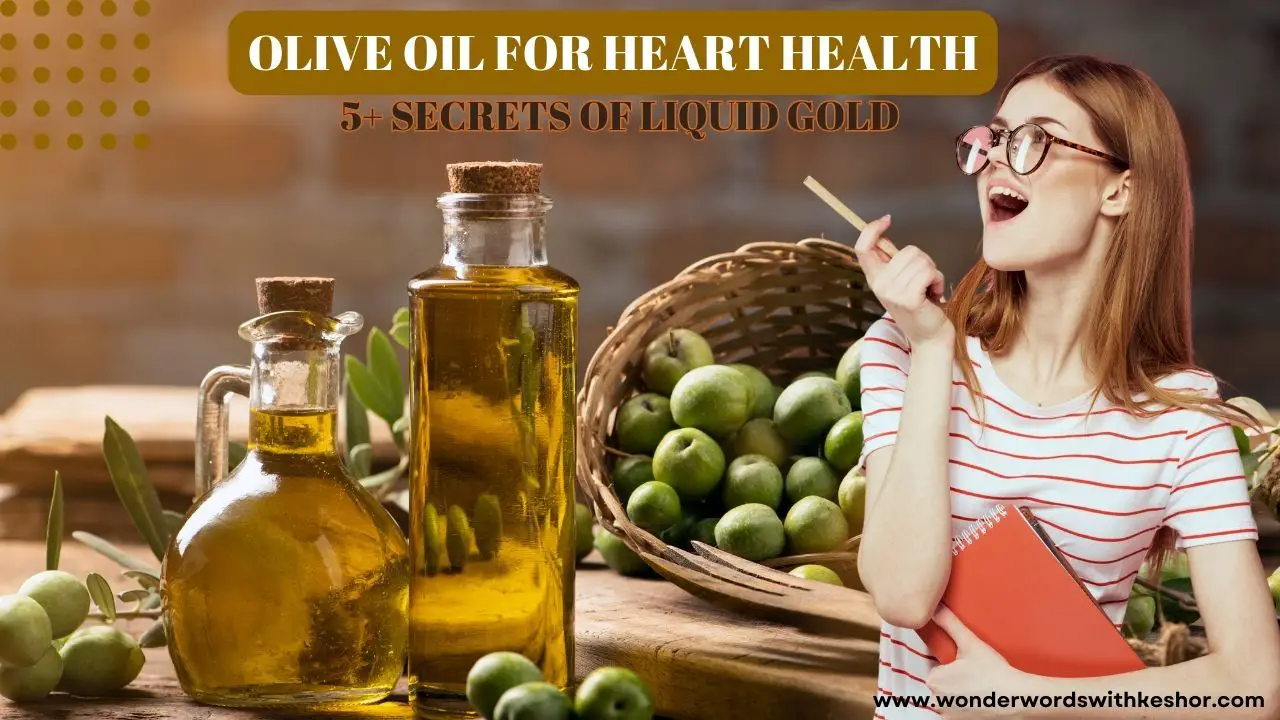Introduction
Olive Oil for Heart Health: Olive oil, often referred to as “liquid gold,” has been a staple in kitchens and medicine cabinets for centuries. Its versatile uses extend beyond the culinary realm, with numerous health benefits attributed to its consumption. Among these benefits, one of the most prominent is its positive impact on heart health.
In this comprehensive article, we’ll explore the fascinating world of olive oil, its rich history, nutritional composition, and the role it plays in promoting a healthy heart. We’ll delve into scientific evidence, expert opinions, and real-life testimonials, all while unraveling the secrets of cooking with this extraordinary oil.
So, fasten your seatbelts as we embark on a journey through the olive groves of knowledge and discover how olive oil can be your trusted ally in the quest for a healthier heart.
Table of Contents
Olive Oil for Heart Health: Unlocking the 5+ Secrets of Liquid Gold for Your Heart
The Wonders of Olive Oil
Understanding the Basics of Olive Oil
Olive oil is not just a simple cooking ingredient; it’s a complex substance with various forms and grades. We’ll start our exploration by understanding the different varieties of olive oil and the intricate production process that goes into making this liquid gold.
Varieties of Olive Oil
Olive oil is available in different grades, each showcasing unique qualities and features. These include Extra Virgin Olive Oil, Virgin Olive Oil, Pure Olive Oil, Olive-Pomace Oil, and Light Olive Oil. Each grade has its unique qualities and applications in cooking.
Production Process
To fully appreciate olive oil, we must comprehend the labor-intensive process of making it. This process includes harvesting olives, crushing and pressing them, decanting and separating the oil, and finally, storage and bottling.
Nutritional Composition
Olive oil is more than just fat. It’s packed with essential nutrients that provide a myriad of health benefits. We’ll break down its nutritional composition and explore the unique components that make it so heart-healthy.
Monounsaturated Fats
Olive oil is primarily composed of monounsaturated fats, with oleic acid being the dominant fatty acid. We’ll delve into the different types of monounsaturated fats found in olive oil, including oleic acid, linoleic acid, and palmitic acid.
Antioxidants
In addition to healthy fats, olive oil is rich in antioxidants. These compounds, such as polyphenols, vitamin E, and chlorophyll, play a crucial role in protecting the body from oxidative stress and inflammation.
Extra Virgin Olive Oil vs. Regular Olive Oil
Not all olive oils are created equal. We’ll uncover the differences between extra virgin olive oil and regular olive oil, and why the former is often considered the superior choice for heart health.
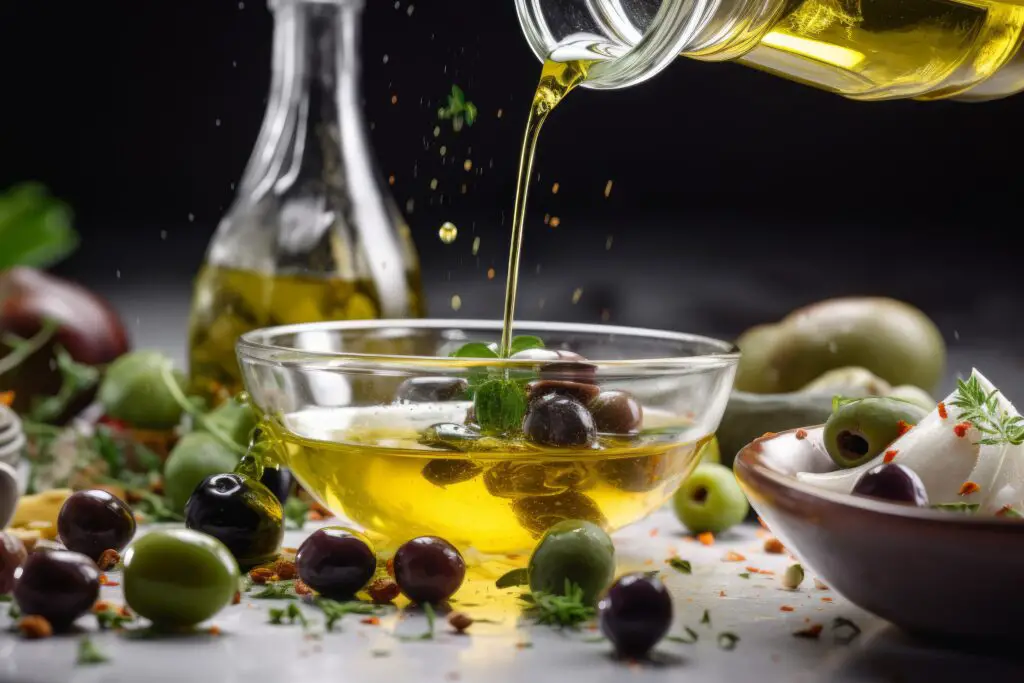
Olive Oil for Heart Health: Unlocking the 5+ Secrets of Liquid Gold for Your Heart
The Mediterranean Diet Connection
Mediterranean Diet Overview
The Mediterranean diet is renowned for its heart-healthy qualities. We’ll take a closer look at this dietary pattern and its significance in the context of cardiovascular well-being.
This diet is characterized by a high consumption of fruits, vegetables, whole grains, and legumes, along with moderate intake of fish, poultry, and red wine. It encourages a reduction in red meat and processed foods, and a liberal use of olive oil.
Olive Oil as the Primary Fat Source
Olive oil isn’t just a part of the Mediterranean diet; it’s its cornerstone. We’ll explore how olive oil takes center stage in this dietary regimen.
In the Mediterranean diet, olive oil is not just a cooking ingredient; it’s a source of healthy fats that replace less heart-friendly options like saturated and trans fats.
Historical Significance
The roots of the Mediterranean diet trace back to ancient civilizations. We’ll journey through history to understand how this dietary tradition evolved and its impact on heart health.
From the ancient Greeks to the Romans, the use of olive oil as a central dietary component has a long and storied history. It has been praised for both its culinary and medicinal qualities, and its role in promoting longevity.
How Does Olive Oil Benefit Heart Health?
Lowering Bad Cholesterol (LDL)
Elevated levels of LDL cholesterol are widely recognized as a well-established risk factor for heart disease. We’ll discuss how olive oil can help reduce LDL cholesterol levels and mitigate this risk.
Olive oil contains monounsaturated fats that have been shown to lower LDL cholesterol levels. Additionally, it helps prevent the oxidation of LDL cholesterol, which is a crucial step in the formation of arterial plaque.
Raising Good Cholesterol (HDL)
Not all cholesterol is bad for your heart. We’ll learn how olive oil can increase the levels of good cholesterol, HDL, and enhance your heart health.
A high level of HDL cholesterol is associated with a lower risk of heart disease, and olive oil has been shown to boost these levels.
Reducing Blood Pressure
Hypertension is a silent killer. We’ll explore the blood pressure-lowering effects of olive oil and its role in maintaining a healthy cardiovascular system.
Olive oil has properties that can help relax blood vessels and improve blood flow, thereby lowering blood pressure.
Anti-Inflammatory Properties
Inflammation plays a pivotal role in heart disease. We’ll uncover how the anti-inflammatory properties of olive oil can protect your heart.
Chronic inflammation is a common factor in heart disease, and olive oil’s antioxidants and anti-inflammatory compounds help reduce this risk.
Preventing Arterial Plaque Formation
Arterial plaque buildup can lead to heart attacks and strokes. We’ll discuss how olive oil can prevent and even reverse this dangerous process.
Olive oil helps prevent the formation of arterial plaque by reducing oxidative stress and inflammation, two key factors in plaque development.

Olive Oil for Heart Health: Unlocking the 5+ Secrets of Liquid Gold for Your Heart
The Scientific Evidence
Studies and Research on Olive Oil
Scientific studies form the backbone of our understanding of olive oil’s impact on heart health. We’ll review the most significant research in this field.
Numerous studies have explored the cardiovascular benefits of olive oil, from clinical trials to observational studies. These studies provide a wealth of data on its effects on cholesterol levels, blood pressure, and overall heart health.
Testimonials and Real-Life Experiences
Real people, real results. We’ll hear the stories of individuals who have incorporated olive oil into their diets and experienced remarkable improvements in their heart health.
Personal testimonials and anecdotes provide a human touch to the scientific evidence, giving readers a relatable perspective on the benefits of olive oil.
Expert Opinions and Recommendations
We’ll seek insights from medical professionals and nutrition experts to gain a comprehensive understanding of how olive oil fits into a heart-healthy lifestyle.
Gathering insights and recommendations from experts in the field adds credibility to the benefits of olive oil and provides readers with trusted advice.
Cooking with Olive Oil
The Right Way to Use Olive Oil in Cooking
Cooking with olive oil requires some know-how. We’ll explore the best practices to ensure you get the most out of this remarkable ingredient.
Properly using olive oil in cooking involves understanding its smoke point, the right cooking methods, and how to store it for freshness.
Recipes and Meal Ideas
We’ll provide you with delectable recipes and meal ideas that incorporate olive oil, allowing you to savor its goodness while supporting your heart health. Some of the recipes include:
Mediterranean Salad
A refreshing and heart-healthy salad that combines crisp vegetables, feta cheese, olives, and a drizzle of extra virgin olive oil.
Grilled Vegetables
Learn how to grill a colorful assortment of vegetables, enhanced with the flavors of olive oil and Mediterranean herbs.
Olive Oil-Infused Pasta
A simple yet flavorful pasta dish where olive oil takes the center stage, complemented by garlic, red pepper flakes, and fresh herbs.
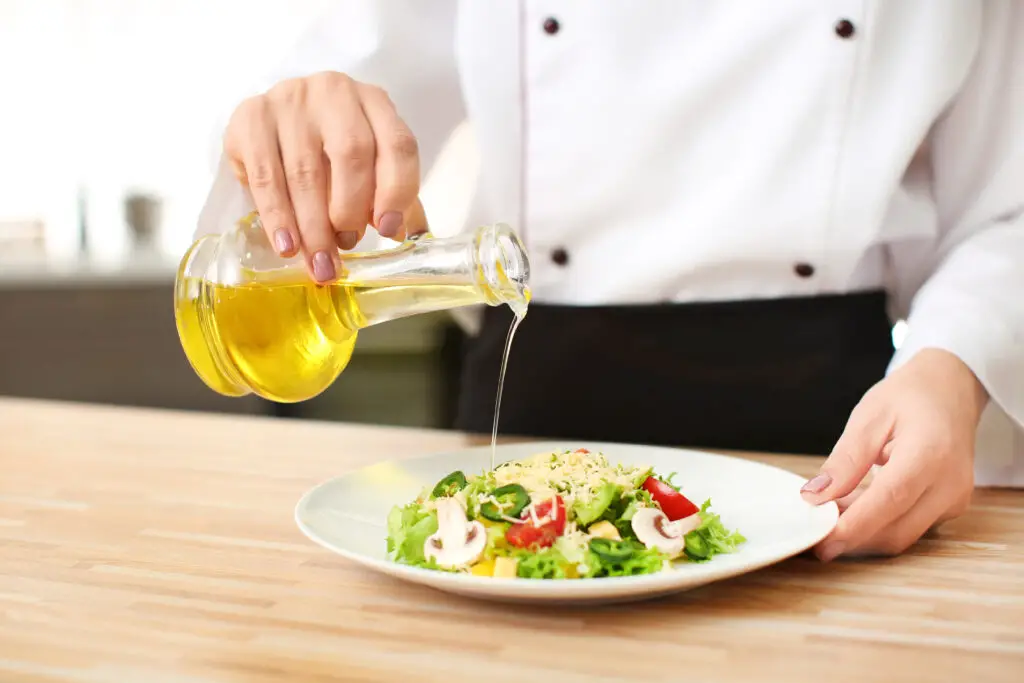
Olive Oil for Heart Health: Unlocking the 5+ Secrets of Liquid Gold for Your Heart
Incorporating Olive Oil into Your Diet
Daily Recommended Intake
How much olive oil should you consume daily for optimal heart health? We’ll provide guidelines and recommendations.
Understanding the recommended daily intake of olive oil ensures that you reap its benefits without overindulging.
Substituting Other Fats
We’ll reveal how you can swap out less healthy fats with olive oil in your daily cooking and meal preparations.
Substituting olive oil for butter, margarine, or other less heart-healthy fats can be a simple yet effective change in your diet.
Combining with Heart-Healthy Foods
Olive oil isn’t the only heart-healthy food. We’ll explore how it can complement other foods that promote cardiovascular well-being.
Pairing olive oil with a diet rich in fruits, vegetables, whole grains, and lean proteins creates a powerful combination for heart health.
Olive Oil and Weight Management
The Relationship Between Olive Oil and Weight Loss
Can olive oil help you shed those extra pounds? We’ll examine its role in weight management.
While olive oil is calorie-dense, it can still be a part of a weight loss plan when consumed in moderation and as a replacement for saturated and trans fats.
The Myth of Olive Oil Making You Gain Weight
Dispelling the misconception that olive oil can lead to weight gain and obesity.
Olive oil, when used responsibly and in the context of a balanced diet, is not linked to weight gain; in fact, it can be part of a weight-conscious lifestyle.
Buying the Best Olive Oil
Reading Labels and Understanding Grades
Choosing the right olive oil can be confusing. We’ll provide tips on how to read labels and understand the different grades.
Understanding the labels and grades of olive oil helps consumers make informed choices when purchasing this precious ingredient.
Storage and Shelf Life
Olive oil is sensitive to light and heat. We’ll guide you on proper storage to maintain its quality and potency.
Knowing how to store olive oil ensures that it retains its freshness and nutritional value.
Authenticity and Quality Control
The market is flooded with counterfeit olive oils. We’ll discuss how to ensure you’re purchasing authentic, high-quality products.
Identifying authentic olive oil and avoiding fraudulent or adulterated products is crucial for reaping the health benefits.
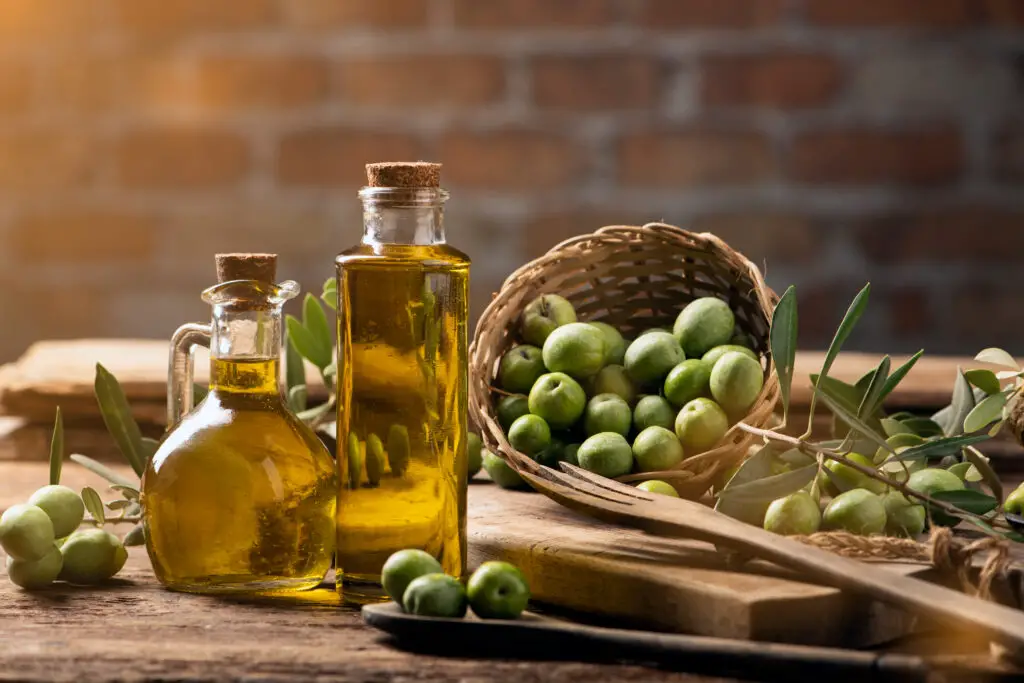
Olive Oil for Heart Health: Unlocking the 5+ Secrets of Liquid Gold for Your Heart
Potential Side Effects and Allergies
Digestive Issues
In rare cases, olive oil can cause digestive discomfort. We will delve into these problems and discuss how to prevent them.
Some individuals may experience digestive issues, such as heartburn or indigestion, when consuming olive oil. Understanding the causes and solutions is essential.
Allergic Reactions
Some individuals may be allergic to olive oil. We’ll delve into the signs and symptoms of olive oil allergies.
While rare, olive oil allergies can occur. Recognizing the signs and understanding potential allergens in olive oil is vital for those with sensitivities.
Safe Usage and Precautions
Practicing safe usage of olive oil is essential. We’ll provide guidelines for its proper consumption and potential contraindications.
Following safety guidelines and precautions ensures that olive oil enhances your health without any adverse effects.
Olive Oil and Other Health Benefits
Skin and Hair Health
Olive oil isn’t just for your heart; it can do wonders for your skin and hair. We’ll explore its beauty-enhancing properties.
Olive oil’s antioxidants and healthy fats offer benefits for skin hydration, hair conditioning, and even anti-aging.
Cognitive Benefits
Emerging research suggests that olive oil may have cognitive benefits. We’ll delve into this fascinating connection.
The potential link between olive oil consumption and cognitive health is a promising area of research, offering hope for brain health.
Cancer Prevention
Can olive oil contribute to cancer prevention? We’ll discuss the potential anti-cancer properties of this remarkable oil.
While more research is needed, there is evidence to suggest that the antioxidants in olive oil may play a role in cancer prevention.
Olive Oil Supplements and Alternatives
Olive Oil Capsules
If you’re not a fan of the taste or want a convenient alternative, olive oil capsules are an option. We’ll explore their pros and cons.
Olive oil capsules offer a convenient way to obtain the health benefits without the taste. However, they come with their own considerations.
Olive Leaf Extract
Olive leaves have their own set of health benefits. We’ll discuss the potential advantages of olive leaf extract.
Olive leaf extract contains compounds with potential health benefits, including immune system support and antioxidant properties.
Other Healthy Oils
Olive oil isn’t the only beneficial oil. We’ll introduce you to other healthy oils and their unique properties.
Exploring the world of healthy oils allows you to diversify your culinary options and maximize your health benefits.

Olive Oil for Heart Health: Unlocking the 5+ Secrets of Liquid Gold for Your Heart
Olive Oil and Longevity
The Connection to a Longer Life
Centenarians, individuals who live to be 100 or more, often have a common dietary factor: olive oil. We’ll explore this fascinating connection to longevity.
Regions with a high number of centenarians, such as the Mediterranean, often attribute their longevity to their diet, with olive oil being a central component.
Centenarians and Olive Oil Consumption
We’ll hear stories from centenarians who credit olive oil for their remarkable longevity.
The experiences of centenarians serve as living testaments to the potential longevity benefits of a diet rich in olive oil.
Heart-Healthy Lifestyles
Exercise and Physical Activity
A heart-healthy lifestyle isn’t just about diet; it also involves regular physical activity. We’ll explore the importance of exercise for cardiovascular well-being.
Regular exercise is a cornerstone of heart health, and when combined with a heart-healthy diet, it offers a powerful defense against heart disease.
Stress Management
Chronic stress can be detrimental to the heart. We’ll discuss stress management techniques and their role in maintaining a healthy heart.
Effective stress management is vital for heart health, as chronic stress can lead to high blood pressure and other risk factors.
Smoking Cessation
Smoking is a leading cause of heart disease. We’ll explore the benefits of quitting smoking and how olive oil can be part of a smoking cessation plan.
Quitting smoking is one of the most significant steps individuals can take to protect their hearts. Olive oil can complement this journey by providing a healthier alternative.
Combining Olive Oil with Other Heart-Healthy Foods
Fruits and Vegetables
In a heart-healthy diet, it’s crucial to include fruits and vegetables as fundamental elements. We’ll explore how olive oil can enhance the flavor and nutritional value of these foods.
The combination of olive oil with fruits and vegetables not only improves taste but also increases the absorption of essential nutrients.
Nuts and Seeds
Nuts and seeds are rich in heart-healthy fats. We’ll discuss how combining them with olive oil can be a powerful dietary choice.
A mix of nuts, seeds, and olive oil offers a hearty dose of monounsaturated fats and a wide range of vitamins and minerals.
Whole Grains
Whole grains are known for their heart-healthy properties. We’ll delve into the synergy between olive oil and whole grains in promoting cardiovascular well-being.
The pairing of whole grains with olive oil creates a well-rounded diet rich in fiber, antioxidants, and healthy fats, making it a heart-healthy choice that supports overall well-being.
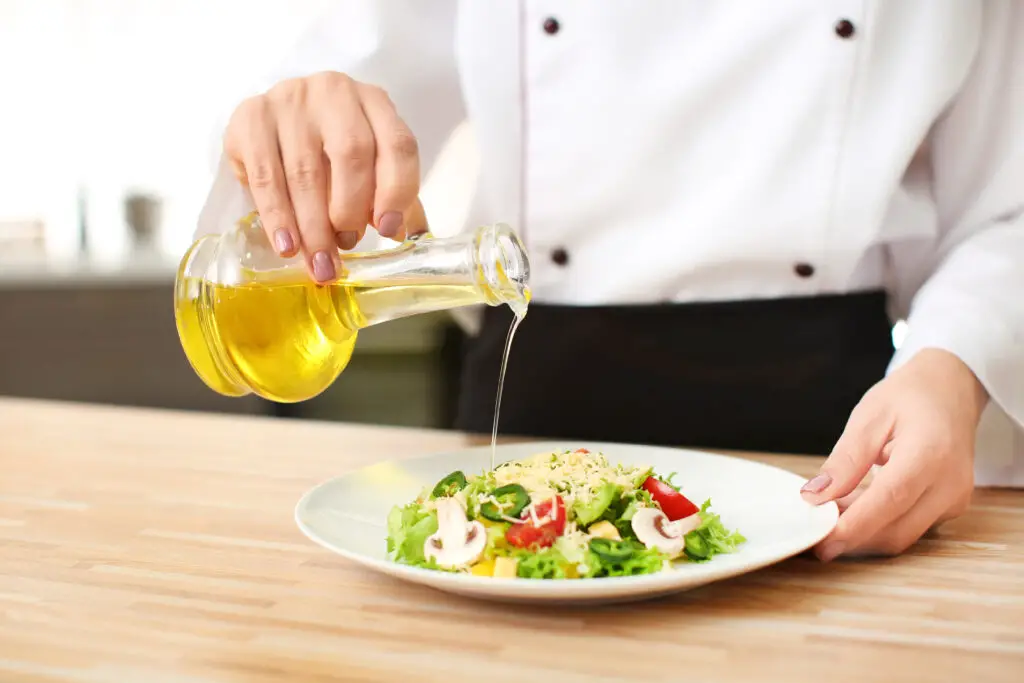
Olive Oil for Heart Health: Unlocking the 5+ Secrets of Liquid Gold for Your Heart
Cooking Tips and Tricks
Temperature Control
Proper cooking temperatures are crucial when using olive oil. We’ll provide tips for maintaining the oil’s quality.
Olive oil has a smoke point, and exceeding it can result in a loss of flavor and health benefits. Knowing how to control cooking temperatures ensures the best results.
Pairing with Spices and Herbs
Spices and herbs can enhance the flavor and health benefits of your meals. We’ll suggest the perfect pairings with olive oil.
Olive oil’s mild flavor makes it an ideal canvas for a variety of spices and herbs that can elevate your dishes to new heights of deliciousness.
Sauteing, Grilling, and Baking with Olive Oil
You can incorporate olive oil into various cooking techniques. We’ll guide you on how to use it for sautéing, grilling, and baking.
Whether you’re sautéing vegetables, grilling meats, or baking, olive oil is a versatile choice that adds a delicate richness to your culinary creations.
Olive Oil in Traditional and Modern Medicine
Historical Medicinal Uses
Olive oil has been used as medicine for centuries. We’ll explore its historical medicinal applications.
Throughout history, olive oil has been used to treat a variety of ailments, from wounds and skin conditions to digestive complaints. Its role in traditional medicine provides insight into its healing properties.
Current Medical Applications
Modern medicine has found new uses for olive oil. We’ll discuss its contemporary medical applications and potential future discoveries.
Olive oil continues to be a subject of medical research, with ongoing investigations into its potential benefits in areas such as heart health, inflammation, and even cancer prevention.
Challenges and Controversies
Misconceptions and Misinformation
Despite its numerous benefits, olive oil is not without controversy. We’ll address common misconceptions and misinformation about its use.
Misinformation and myths can cloud the true benefits of olive oil. We’ll debunk these misconceptions and provide clarity on its role in a healthy lifestyle.
Olive Oil vs. Other Vegetable Oils
How does olive oil compare to other vegetable oils in terms of heart health? We’ll analyze the differences and similarities.
Olive oil is often pitted against other vegetable oils like canola and sunflower oil. We’ll explore the distinctions and help you make informed choices for your health.
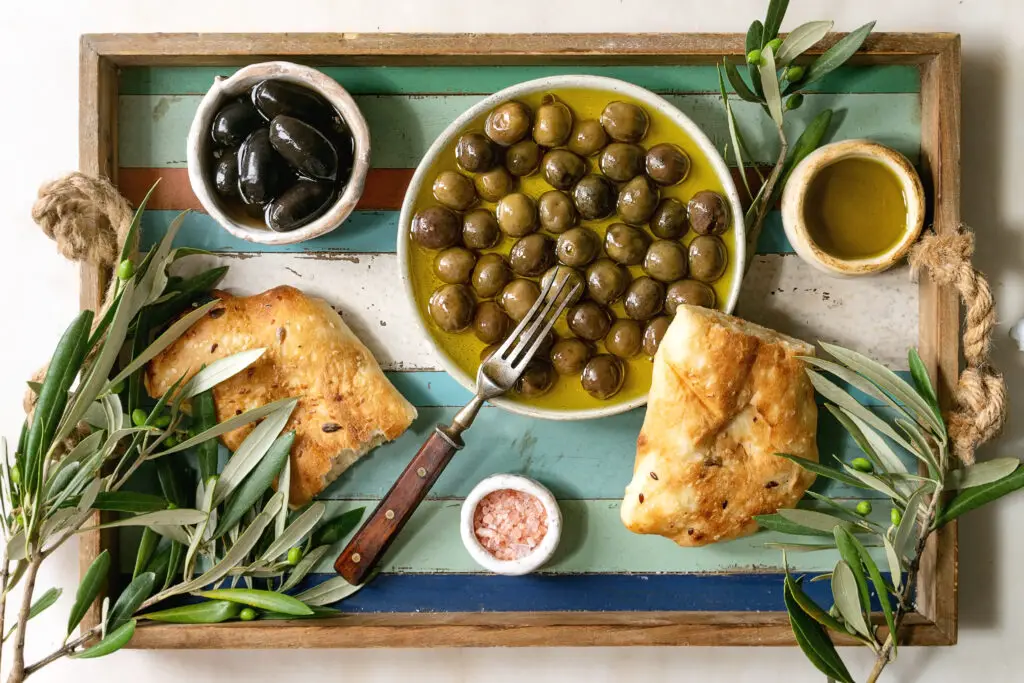
Olive Oil for Heart Health: Unlocking the 5+ Secrets of Liquid Gold for Your Heart
Olive Oil in Different Cultures
Olive Oil in Mediterranean Cuisine
Mediterranean cuisine is a celebration of flavors, and olive oil plays a central role. Its rich, fruity notes enhance various dishes, from simple salads to elaborate spreads. Let’s take a culinary tour through the Mediterranean region to appreciate how olive oil is used.
Mediterranean countries, such as Greece, Italy, Spain, and southern France, have mastered the art of incorporating olive oil into their recipes. In these culinary traditions, olive oil is not just a cooking medium; it’s a fundamental element of their identity.
In Greek cuisine, olive oil is drizzled generously over Greek salads, making them shine with freshness. Tzatziki, a yogurt and cucumber dip, is another staple infused with the golden elixir. In Italy, extra virgin olive oil is used to create exquisite pasta dishes, where it binds the ingredients into a harmonious blend. The classic Caprese salad with tomatoes, mozzarella, and basil is a canvas for premium olive oil, elevating it to a culinary masterpiece.
Spain, known for its diverse regional cuisines, uses olive oil to create rich and flavorful dishes like paella and gazpacho. And in southern France, olive oil is integral to Provençal cuisine, featuring prominently in dishes like ratatouille and tapenade.
Olive Oil in Middle Eastern Cuisine
Middle Eastern cuisine is a treasure trove of flavors and textures, and olive oil is an essential component. Middle Eastern cooking, with its aromatic spices and bold flavors, relies on olive oil to bring balance to dishes.
One iconic Middle Eastern dish where olive oil shines is hummus. The creaminess of chickpeas, the nuttiness of tahini, and the freshness of lemon juice all come together beautifully with a drizzle of olive oil on top. Baba ghanoush, made from roasted eggplant, is another dish that showcases the magic of olive oil.
In Lebanon, olive oil is a symbol of hospitality and is often served with fresh flatbreads for dipping. The richness of olive oil pairs wonderfully with the smoky flavors of grilled meats and vegetables in dishes like shish kebabs.
Olive Oil in Asian Cuisine
While olive oil is more commonly associated with Mediterranean and Middle Eastern cuisines, it is gradually making inroads into Asian cooking. Traditionally, Asian cuisines have used oils like sesame, peanut, and coconut for cooking. However, olive oil’s health benefits have led to its adoption in certain Asian dishes and fusion cuisines.
In Indian cuisine, olive oil is used for sautéing vegetables, making healthier versions of traditional dishes like pakoras and bhajis. It’s also used in marinades for tandoori dishes, adding a unique twist to the classic flavors.
In Asian cultures, the mild flavor of olive oil makes it a versatile ingredient that can be incorporated into various dishes. It’s becoming a popular choice for stir-frying vegetables, drizzling over salads, and even for making innovative fusion recipes that combine the best of both worlds.

Olive Oil for Heart Health: Unlocking the 5+ Secrets of Liquid Gold for Your Heart
Heart Health Testimonials
Personal Stories of Transformation
Real people have experienced remarkable transformations in their heart health journeys through the incorporation of olive oil. We’ll share inspiring personal stories that showcase the potential of this golden elixir.
These testimonials reflect the experiences of individuals who have embraced olive oil as a key component of their heart-healthy lifestyle. Their stories serve as a testament to the remarkable impact of this ancient elixir on modern health.
Testimonials from Health Professionals
The perspective of health professionals is invaluable. We’ll hear from doctors, nutritionists, and dietitians who have seen the positive effects of olive oil on their patients.
Medical experts play a critical role in guiding patients towards heart-healthy choices. Their experiences with olive oil as a therapeutic agent provide a holistic view of its benefits.
Conclusion and Future of Heart Health with Olive Oil
Summary of Key Takeaways
In this final chapter, we’ll summarize the essential points and key takeaways from our exploration of olive oil’s role in promoting heart health.
This summary will provide a quick reference to the key findings and insights presented throughout the article, ensuring that readers have a clear understanding of the potential benefits of olive oil for heart health.
The Ongoing Research and Potential Discoveries
The scientific community continues to investigate the potential benefits of olive oil. We’ll discuss the current research and the future possibilities for enhancing heart health with this remarkable oil.
As research into olive oil’s impact on heart health advances, new discoveries may pave the way for innovative approaches to cardiovascular well-being. We’ll explore the potential breakthroughs that lie ahead.
A Heart-Healthy Future with Olive Oil
In closing, we’ll reflect on the enduring importance of olive oil in promoting heart health and how it can contribute to a future where heart disease is less prevalent, and individuals enjoy a longer, healthier life.
The journey through the world of olive oil has shown that it is not merely a cooking ingredient; it’s a holistic lifestyle choice that can lead to a heart-healthy future for individuals and communities alike.
https://www.youtube.com/watch?v=PwVqISxbPYc

Frequently Asked Questions (FAQs):
Olive Oil for Heart Health: Unlocking the 5+ Secrets of Liquid Gold for Your Heart
Q1: What are the different types of olive oil available, and which one is the healthiest?
A1: Olive oil comes in various grades, including Extra Virgin Olive Oil, Virgin Olive Oil, Pure Olive Oil, Olive-Pomace Oil, and Light Olive Oil. Extra Virgin Olive Oil is often considered the healthiest due to its minimal processing and high levels of monounsaturated fats and antioxidants. It retains more of the natural olive flavor and nutritional benefits.
Q2: How can I use olive oil in cooking to maximize its health benefits?
A2: To get the most out of olive oil’s health benefits, use it for low to medium-heat cooking, like sautéing and baking. Drizzle it over salads or use it as a finishing touch to dishes. Avoid overheating it, as excessive heat can diminish its nutritional value.
Q3: Can olive oil help lower cholesterol levels?
A3: Yes, olive oil, particularly Extra Virgin Olive Oil, has been shown to lower LDL (bad) cholesterol levels while increasing HDL (good) cholesterol. Its monounsaturated fats and antioxidants contribute to these heart-healthy effects.
Q4: Are there any potential side effects or allergies associated with olive oil?
A4: While rare, some individuals may experience digestive discomfort like heartburn or indigestion when consuming olive oil. Allergic reactions to olive oil are also possible but uncommon. It’s essential to use olive oil responsibly and consult a healthcare professional if you experience adverse effects.
Q5: Can olive oil be used for weight loss, or does it lead to weight gain?
A5: Olive oil is calorie-dense, so consuming it in moderation is crucial for weight management. When used as a replacement for saturated and trans fats, it can be part of a weight-conscious diet. The misconception that olive oil leads to weight gain is unfounded when used responsibly.
Q6: Is it safe to cook with olive oil at high temperatures?
A6: Olive oil has a smoke point, which varies depending on the grade. Extra Virgin Olive Oil has a lower smoke point, making it suitable for low to medium-heat cooking. Using it for high-heat cooking can result in a loss of flavor and health benefits. For high-heat cooking, consider other oils with higher smoke points.
Q7: How can I ensure I’m buying authentic, high-quality olive oil?
A7: To ensure you’re purchasing authentic, high-quality olive oil, read labels carefully, look for certifications, and choose products from reputable brands. Store your olive oil properly in a cool, dark place to maintain its quality and shelf life.
Q8: What is the daily recommended intake of olive oil for heart health?
A8: There is no fixed daily intake, but incorporating 1 to 2 tablespoons of olive oil into your daily diet is generally considered a heart-healthy practice. However, individual dietary needs may vary, so it’s advisable to consult with a healthcare professional for personalized recommendations.
Q9: Can olive oil be used as a beauty product for skin and hair?
A9: Yes, olive oil can be used for skincare and haircare. Its antioxidants and healthy fats make it an excellent natural moisturizer for dry skin and a conditioning treatment for hair. It can also provide anti-aging benefits when applied topically.
Q10: Is there any ongoing research into the health benefits of olive oil?
A10: Yes, research into the health benefits of olive oil continues. Scientists are exploring its potential effects on heart health, inflammation, cognitive benefits, and even cancer prevention. The ongoing research suggests that olive oil may have more to offer in terms of promoting overall well-being.
Olive Oil for Heart Health: Unlocking the 5+ Secrets of Liquid Gold for Your Heart
These FAQs provide answers to some of the most common questions about olive oil and its role in promoting heart health. If you have more specific questions or require further information, please feel free to reach out to us for personalized guidance.
Olive Oil for Heart Health: Unlocking the 5+ Secrets of Liquid Gold for Your Heart
